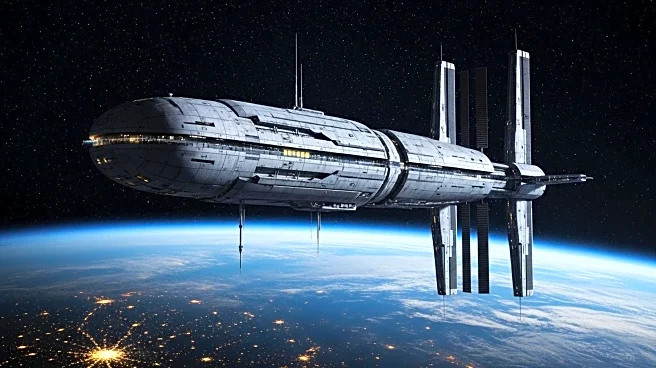What is the story about?
What's Happening?
The crew aboard the International Space Station (ISS) has continued their scientific research and maintenance activities despite the U.S. government shutdown that began on September 29, 2025. The Expedition 73 team, consisting of seven astronauts from various space agencies, including NASA, Roscosmos, and JAXA, has been actively engaged in multiple experiments and station upkeep. Notable activities include NASA astronaut Jonny Kim's work on the State-of-the-art Humidity Removal in Microgravity Payload, which aims to recycle moisture in the spacecraft's atmosphere, and Mike Fincke's installation of the Heat Transfer Host 2 experiment to study condensation processes. The crew also conducted maintenance on the Fluid Science Laboratory and tested the TransAstra Fly Trap Capture Bag Demo for space debris management.
Why It's Important?
The continuation of operations on the ISS during the U.S. government shutdown underscores the critical nature of international collaboration in space exploration. The uninterrupted research and maintenance activities ensure that scientific progress and technological advancements are not hindered by terrestrial political issues. This situation highlights the resilience and independence of space missions from Earth-bound governmental disruptions. The ongoing experiments have significant implications for future deep-space missions, particularly in developing sustainable life-support systems and improving thermal management technologies. The work being done on the ISS could lead to breakthroughs in pharmaceuticals and materials science, benefiting industries and economies on Earth.
What's Next?
As the U.S. government shutdown persists, the ISS crew will continue their scheduled activities, focusing on both scientific research and station maintenance. The international space agencies involved will likely monitor the situation closely to ensure that the necessary support and resources are available to the crew. Future missions and collaborations may be influenced by the outcomes of this period, potentially leading to discussions on how to safeguard space operations from political disruptions. The successful management of the ISS during this time could serve as a model for future international space endeavors.
Beyond the Headlines
The current situation on the ISS may prompt discussions about the ethical and logistical considerations of maintaining space operations during political and economic crises on Earth. The ability of the ISS to function independently of U.S. government operations highlights the importance of international partnerships and shared responsibilities in space exploration. This event could lead to a reevaluation of how space missions are funded and managed, ensuring that critical scientific research is protected from geopolitical uncertainties.















